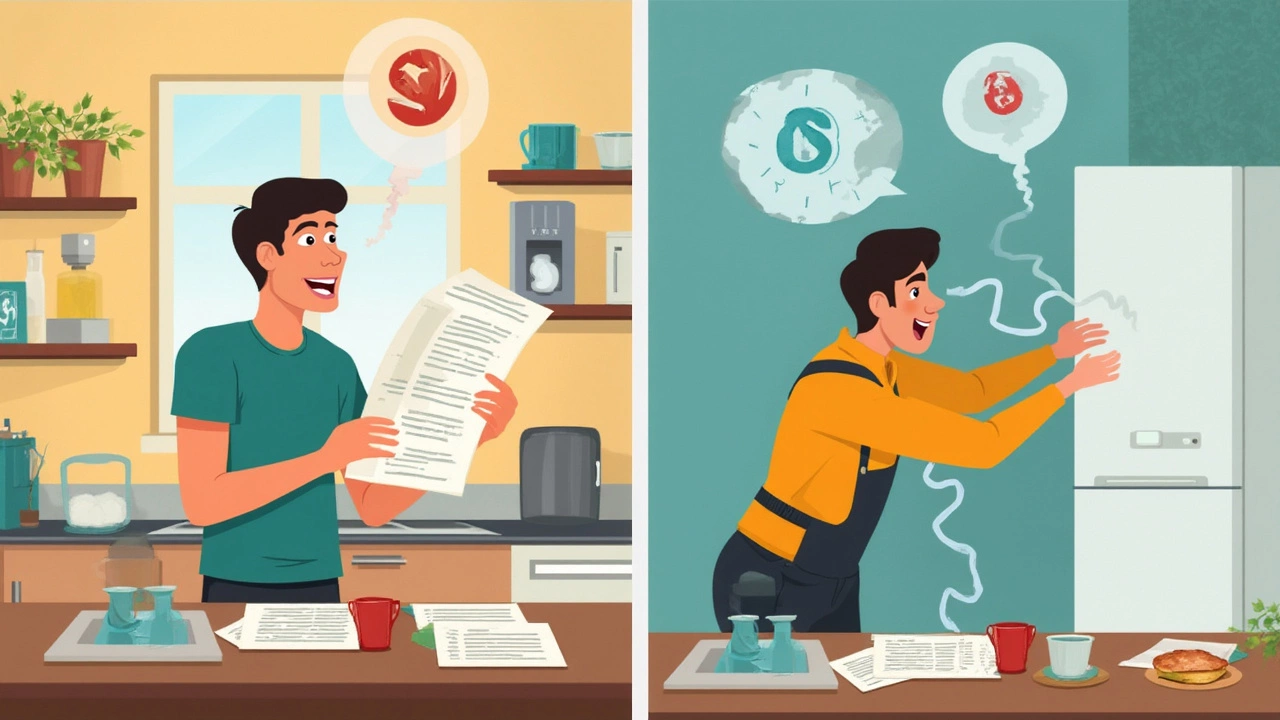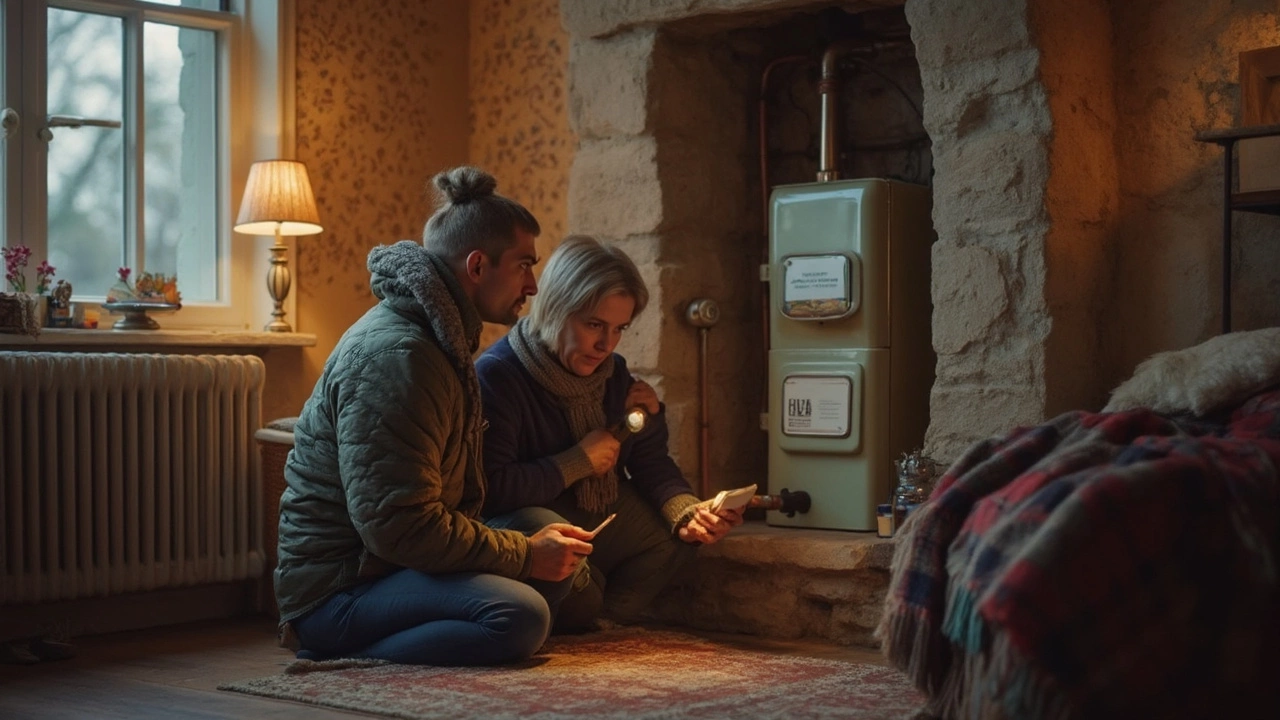Boilers are like cars: sometimes you can squeeze a few more years out of them with a little TLC, but other times, you’re just pouring cash into a lost cause. Before you pull out your wallet for another repair bill, it’s worth asking—am I fixing the real problem, or just delaying the inevitable?
Boilers don’t just fail out of nowhere. Usually, it's a string of warning signs: weird noises, leaks, the heating takes ages, or your energy bills creep up. Some of these issues are cheap to fix, and you might get several more winters out of your boiler for a few hundred bucks. But if the fixes keep coming, or parts are tricky to find because your boiler is from the last century, it’s time to do some math—are repairs stacking up too fast?
If you’re not sure what’s normal, check the age of your boiler. Most have a sweet spot: if yours is under 10 years old and hasn’t been breaking down every six months, a repair could go a long way. But once you hit the 12- to 15-year mark, especially with rising repair bills, replacement usually makes more sense. We’ll get into that number crunching—and simple ways to keep your boiler happy—so you can dodge cold showers and monster heating bills.
- When repairs make sense
- Signs it's time to move on
- The real cost of repair vs replacement
- How to keep your boiler running longer
When repairs make sense
So, when is it actually smart to sink money into your old boiler repair instead of rushing out to get a brand-new unit? For starters, age matters. If your boiler is less than 10 years old and it’s been pretty reliable up until now, most pros agree that fixing it is usually the way to go. Boilers, when installed right and kept up, can run well past a decade—sometimes even 15 years or more.
Here’s the thing: not all breakdowns are created equal. Some boiler problems are straightforward—and relatively cheap—to sort out. Take these common issues:
- Pressure drops: Usually fixed with a quick top-up or minor part replacement, rarely more than a minor callout fee.
- Thermostat glitches: Swapping a wonky thermostat can get your heating back on track without costing a fortune.
- Pilot light or ignition issues: Often caused by a dirty sensor, blocked jet, or simple wiring problem—quick for a pro to sort out.
- Valve replacements: Many valves cost less than a good dinner out, and the labor’s straightforward.
Need some numbers? According to a 2024 survey of UK heating engineers, the most common boiler repair jobs run between £80 and £250. As long as repair bills stay in that zone and aren’t popping up every few months, you’re in safe territory.
Repair also makes sense when parts are easily available and you can trust the work is a proper fix—not a band-aid job. For families on a tight budget, a single repair can buy you a year or two to save for a replacement, which is less painful than an emergency buy in the dead of winter.
But here’s a tip: keep your repair invoices. If you’ve only needed one or two fixes in the last couple of years, you can relax. But if you’re seeing the same fault come back, or your heating engineer starts mumbling about rust or corroded components, then it’s time to start looking into the next section—when to call it quits.
Signs it's time to move on
Some problems just can’t be fixed without a lot of stress and cash. Here’s how to know when it’s smarter to stop pouring money into boiler repair and consider a new unit instead.
- Your boiler is 15 years old or more. Most boilers are built for about 10-15 years. Even with great upkeep, parts get worn down, and newer models use way less fuel.
- Fixes are getting expensive and frequent. If you’re calling for help every year—or worse, a few times a year—it adds up fast. A repair can cost anywhere from $200 to $800, and you never know what’ll break next.
- It’s tough to find parts. When techs tell you they need to track down parts or order from specialty suppliers, your boiler’s basically a dinosaur. Finding rare parts takes extra time and can cost double the normal price.
- Energy bills keep climbing. Older boilers start losing efficiency and waste more gas or oil. If you notice your heating costs went up sharply this winter, it’s a sign your system just isn’t running well.
- Leaking or corroded boiler. If you spot rust, puddles, or corrosion on the main unit, it’s usually not worth repairing. That kind of damage keeps getting worse and is a red flag for replacement.
| Boiler Age | Recommended Action |
|---|---|
| 0-7 years | Repairs usually worthwhile |
| 8-12 years | Repairs okay if infrequent, reconsider with rising costs |
| 13+ years | Time to consider replacement |
Seasonal breakdowns shouldn’t be the norm. If you’re juggling repairs, rising bills, or parts are getting harder to find, it might actually cost less to swap your boiler than keep patching it up. Don’t wait for a cold snap to make your decision.

The real cost of repair vs replacement
Let’s talk numbers, because that’s where most people end up locked in indecision. A typical boiler repair in the UK—even just for a worn ignition or broken pump—will run you £150 to £400, depending on what needs fixing. If it’s something major, like a heat exchanger, you could see bills soaring to £600 or even more. And if you’re calling out an engineer for emergencies or on weekends, expect a premium. These repair costs add up fast, especially if issues keep popping up.
On the flip side, a complete boiler replacement (including labor and disposal) usually costs between £2,000 and £3,500 for an average home with a combi or system boiler. Yeah, it stings a bit, but you get a new warranty (usually five to ten years), lower heating bills thanks to better efficiency, and you won’t have to worry about the thing breaking down at the worst time for a long while.
| Cost Factor | Repair | Replacement |
|---|---|---|
| Initial payment | £150–£600+ | £2,000–£3,500 |
| Warranty | 1–12 months | 5–10 years |
| Running costs | Can remain high due to old parts | Usually lower—up to 30% savings |
| Unexpected breakdowns | Higher risk | Very low risk |
Here’s a tip: If you’re facing several repair bills a year or you’ve paid over £600 in the last 12 months to keep your boiler going, you’re already halfway toward the price of a new one. At that point, replacement is usually smarter, financially. Plus, a new boiler with an A-rating could slash up to £400 a year from your energy costs compared to an old G-rated clunker.
Don’t forget the hidden costs, either. An unreliable boiler can cause water damage if it leaks, or leave you with no hot water just as you’re heading off to work. That hassle has a value too—even if it isn’t on the invoice.
If your boiler’s only a few years old, hasn’t let you down much, and the repair bill is less than half the replacement cost, a fix probably makes sense. But the older it is, the more “repair or replace” tips the scale towards a full upgrade. That’s why it pays to keep track of your repair bills and weigh them against buying a new, more efficient boiler before you end up breaking the bank.
How to Keep Your Boiler Running Longer
If you want your boiler repair bills low and your heat reliable, a little bit of regular care makes a huge difference. Most problems with boilers come from stuff you can actually catch early and fix before it blows your budget. Here’s how to get the most life out of your system:
- Annual servicing: Get your boiler checked by a certified pro once a year. A regular service can spot small leaks, risky pressure issues, or worn-out parts before they cause bigger trouble. Not only does this keep your warranty valid, but it also boosts efficiency, so you save on energy bills.
- Bleed your radiators: If your heating isn’t even, trapped air could be the culprit. Bleeding radiators is simple, gets your home warmer faster, and takes the strain off your boiler.
- Keep an eye on the pressure: Most boilers run best at about 1–1.5 bar. If pressure falls outside this range, your heating or hot water can go haywire. Top up the pressure if it’s low, or call a pro if it’s shooting up or dropping fast.
- Check for leaks: Tiny leaks can turn into big problems. Check around the unit, pipes, and joints for any signs of drips or rust stains. If you spot anything, don’t wait—call in a repair technician.
- Clean the exterior and vents: Dust and grime can mess with your boiler’s ventilation and efficiency. Make sure nothing is blocking air vents and wipe down the casing every so often.
Worried about breakdowns? Here’s a quick peek at how much preventive care really helps, based on data from a 2023 UK home heating survey:
| Maintenance Habit | Chance of Major Boiler Failure in 10 Years |
|---|---|
| Annual Professional Service | 18% |
| No Regular Service | 52% |
That’s a big gap. Spending a little time each year on maintenance can save you hundreds—or even thousands—by dodging early replacements or big boiler repair jobs. If you’re not sure what to do, most heating companies offer cheap maintenance plans. They’ll handle the reminders and catch problems before you notice them.
Last thing: don’t ignore weird noises, new smells, or any change in your heating bills. These are usually the first signs your boiler is trying to tell you something. Jump on these early, and you might just keep your system running well beyond the typical lifespan.





